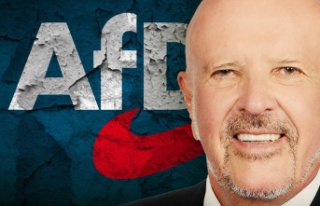Matthias von Dombrowski has been working in the Port of Hamburg since 1980, currently for the Gesamthafenbetriebs-Gesellschaft (GHB). But the veteran has never experienced such a hard labor dispute as is currently the case. A two-day warning strike by dockers escalated last Friday in scuffles with the police. The Hamburg Labor Court, in turn, imposed a six-week peace obligation for the parties to the agreement until August 26th. Until then, employers and employees will meet for a total of three talks. The first is scheduled for next Wednesday, the other two for August 10th and 22nd.
"During the peace obligation in Hamburg, hardly any port workers will voluntarily do overtime on the weekends and during the week, at the Hamburg terminals and in the other ports probably not either," said Dombrowski WELT AM SONNTAG. He is a member of the Federal Collective Bargaining Commission of the Verdi trade union and a member of the negotiating committee for employees in the current round of collective bargaining.
“Massive extra work on the weekends was the reason why the port terminals were still able to function during the severe logistical upheavals since the beginning of the pandemic. But employers show no appreciation for dockers.”
At the moment, the port workers are primarily concerned with the port companies accommodating them with inflation, which is very high by German standards. They recently called for 7.4 percent inflation compensation and a wage increase of 1.20 euros per hour. "We wanted to achieve a contract term of twelve months for the intended inflation adjustment, but in three rounds of negotiations with the employers we entered into a discussion about a possible term of 24 months," says Dombrowski. "Ultimately unsuccessful because the employers were not seriously willing to agree on an opt-out clause that we needed for the second year of the term."
Against the background of the unclear development of inflation in 2023, they see this as "a one-sided risk for dock workers and therefore unacceptable". The Central Association of German Seaport Companies (ZDS), which represents companies such as HHLA and Eurogate on the employer side, is currently keeping a low profile: "The ZDS welcomes the settlement reached in court between the parties to the collective bargaining agreement," said Ulrike Riedel, chief negotiator at the ZDS. "The ZDS will comply with this comparison and arrange appointments with Ver.di to bring about a solution that is viable for both sides."
In fact, there is much more at stake behind the scenes than adjusting wages and salaries. For years, a conflict has been simmering in the northern ports between dock workers and terminal operators because the companies want to automate and rationalize their systems more. For example, Eurogate recently announced investments in greater automation of the container terminal JadeWeserPorts in Wilhelmshaven. HHLA is working on making Germany's largest container terminal, the Burchardkai in Hamburg, more automated.
The employees do not feel taken along. “The port workers – this is how the employers imagine it – should work 150 percent for years until they are then processed through more automation. They should generate their own rationalization, as it were,” says Dombrowski. Eurogate's automation concept at the JadeWeserPort in Wilhelmshaven doesn't work: "And we don't see any coherent concepts at other terminals like the HHLA-Burchardkai in Hamburg either."
In the port and shipping industry, there are growing concerns that the industrial action could set German seaports even further behind competitors such as Rotterdam and Antwerp. “We view the current collective bargaining dispute and the recent strikes with great concern. The demands cannot be justified with the additional quantities in the ports," said Alexander Geisler, Managing Director of the Hamburg and Bremen Shipbrokers Association, to WELT AM SONNTAG.
“Unlike the US ports, which were able to grow significantly during the Covid crisis, throughput is stagnating in many German ports, which is mainly due to lower productivity. Unlike in the USA, for example, Verdi's demands cannot be justified by increased output, higher productivity or additional quantities."
This is particularly problematic because the disruptions in the logistics chains caused by the pandemic are far from over. Container loads are still piling up in German seaports, and container freighters are lying in the roadsteads in the North Sea until they are delayed in handling, says Geisler: “This is clearly about satisfying particular interests that are subsequently ideologically justified. This is all the more astonishing since Ver.di is satisfied with significantly lower qualifications in other professional groups.” In order to meet the challenges ahead, “higher productivity and investment in an efficient infrastructure and suprastructure are required”.
Verdi, on the other hand, and the representatives of the port workers see no foreseeable solution for the deeper problems at the German terminals, regardless of how the ongoing wage conflict ends: "There are no viable personnel concepts among the operators of the large German port terminals," says Dombrowski. "There are simply too few longshoremen, also given that the baby boomers are now retiring."












